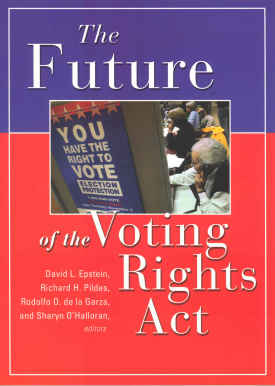
The Future of the Voting Rights Act
About This Book
The Voting Rights Act (VRA) stands among the great achievements of American democracy. Originally adopted in 1965, the Act extended full political citizenship to African-American voters in the United States nearly 100 years after the Fifteenth Amendment first gave them the vote. While Section 2 of the VRA is a nationwide, permanent ban on discriminatory election practices, Section 5, which is set to expire in 2007, targets only certain parts of the country, requiring that legislative bodies in these areas—mostly southern states with a history of discriminatory practices—get permission from the federal government before they can implement any change that affects voting. In The Future of the Voting Rights Act, David Epstein, Rodolfo de la Garza, Sharyn O’Halloran, and Richard Pildes bring together leading historians, political scientists, and legal scholars to assess the role Section 5 should play in America’s future.
The contributors offer varied perspectives on the debate. Samuel Issacharoff questions whether Section 5 remains necessary, citing the now substantial presence of blacks in legislative positions and the increasingly partisan enforcement of the law by the Department of Justice (DOJ). While David Epstein and Sharyn O’Halloran are concerned about political misuse of Section 5, they argue that it can only improve minority voting power—even with a partisan DOJ—and therefore continues to serve a valuable purpose. Other contributors argue that the achievements of Section 5 with respect to blacks should not obscure shortcomings in the protection of other groups. Laughlin McDonald argues that widespread and systematic voting discrimination against Native Americans requires that Section 5 protections be expanded to more counties in the west. Rodolfo de la Garza and Louis DeSipio point out that the growth of the Latino population in previously homogenous areas and the continued under-representation of Latinos in government call for an expanded Section 5 that accounts for changing demographics.
As its expiration date approaches, it is vital to examine the role that Section 5 still plays in maintaining a healthy democracy. Combining historical perspective, legal scholarship, and the insight of the social sciences, The Future of the Voting Rights Act is a crucial read for anyone interested in one of this year’s most important policy debates and in the future of civil rights in America.
DAVID L. EPSTEIN is professor of political science at Columbia University.
RICHARD H. PILDES is Sudler Family Professor of Constitutional Law at New York University School of Law.
RODOLFO O. DE LA GARZA is faculty fellow in the Department of Political Science and director of the Project on Immigration, Ethnicity, and Race at the Institute for Social and Economic Research and Policy at Columbia University.
SHARYN O'HALLORAN is the George Blumenthal Professor of Politics and professor of international and public affairs at Columbia University.
CONTRIBUTORS: David L. Epstein, Richard H. Pildes, Rodolfo O. de la Garza, Sharyn O'Halloran, Stephen Ansolabehere, Thomas Brunell, Bruce E. Cain, Guy-Uriel E. Charles, Louis DeSipio, Luis Fuentes-Rohwer, Heather K. Gerken, Bernard Grofman, Richard L. Hasen, Samuel Issacharoff, Karin MacDonald, Peyton McCrary, Laughlin McDonald, Michael P. McDonald, Spencer Overton, Nathaniel Persily, Christopher Seaman, and Richard Valelly.
